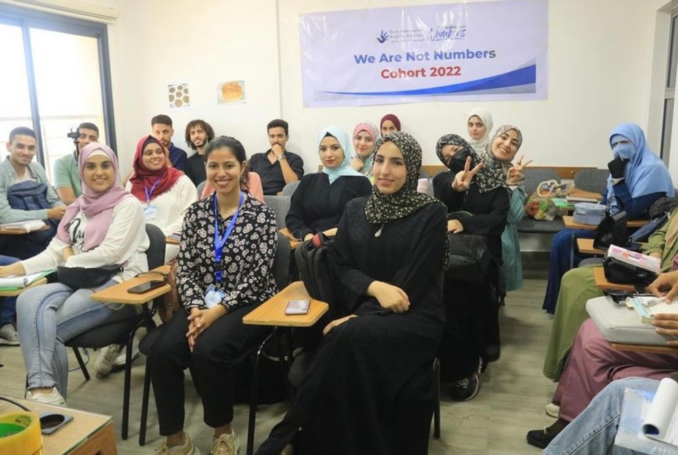
Since the genocide in Gaza began in October of last year, the lives of those young students, along with all of Gaza, are unrecognizable. Four students from the 2022 cohort recently shared their experiences with me.
During my visit to Gaza in 2022, I had the opportunity and honor to meet and lead a workshop with the 2022 ’We Are Not Numbers’ cohort. We Are Not Numbers (WANN), is a “youth-led Palestinian nonprofit project” which aims to train Gaza’s youth in media and journalism. The organization was founded in 2015, with its iconic co-founder Dr. Refaat Alareer, a prolific educator, writer and poet having been assassinated by the Israeli military on December 6, 2023.
WANN gives the youth in Gaza a voice and a platform to express their opinions and reflect on their experiences and hopes for the future.
Since the genocide in Gaza began in October of last year, the lives of those young students, along with all of Gaza, are unrecognizable. Four students from the 2022 cohort recently shared their experiences with me. They are scattered throughout Gaza and in the Diaspora. For the sake of their security, and Israel’s frequent targeting of Palestinian journalists, I will use aliases for the interviewees.
Wafa – ‘A Brighter Tomorrow’
The summer I met Wafa, she was 20 years old, starting her third year of university, studying English literature and translation. Now graduated, Wafa looked to expand her writing career. “I have been writing since I was young.” Wafa told me, “I got used to writing in my diaries, until one day I said to myself, why not improve my writings and get them published among a big audience and many readers? I dreamt of becoming a famous, effective, inspiring writer and poet.” This is what initially inspired her to apply for WANN.
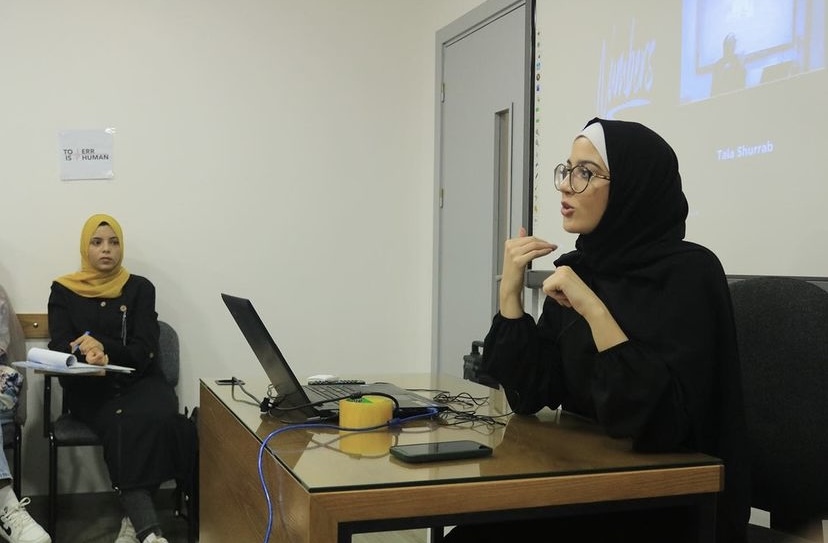
Despite Gaza’s high rates of unemployment before the war, Wafa’s lucrative skills set her up for a path of success.
Wafa graduated at the top of her class. “I was always thinking of a brighter tomorrow waiting for me. I was and still am ambitious with endless dreams.”
But all of this changed when Israel’s genocidal campaign in Gaza began. Wafa now finds herself displaced, having been evacuated multiple times in the last 10 months, from tents to the homes of relatives across Gaza.
While she was developing herself, she worked as a freelancer – writing, translating, and subtitling. But now, “Everything has changed for the worse. My dreams have been turned into ashes. All of the workplaces here have been destroyed. Even when you need to work online, there is no stable internet connection, and you have to go far to find it.”
“Even when this ends,” Wafa explained, “There are no places to work. There are no universities to complete your studies.”
All of Wafa’s goals for the year have shifted, “All of my plans have been turned into only trying to stay alive.”
Omar – ‘A Speaker for Freedom’
“I always believed that WANN was the gate towards my dreams, and it would always pave the way for me…I did not take into consideration that a war might come and change everything,” Omar told me.
Like most 22-year-olds, Omar was ready to graduate and start his life. “I always wanted to travel, to go outside, to hang out with my friends, to study abroad, to evolve my skills.” Unfortunately, he was scheduled to graduate with his degree in English literature and education just a couple of months after October 7. Now, 100% of universities in Gaza have been damaged or destroyed and the future and fate for Gaza’s college students is bleak and uncertain.
To add to the suffering, Omar was severely injured after evacuating his home to the Jabaliya refugee camp. After going with his friend, Mohammad to look for highly sought-after food, he suddenly found himself buried under the rubble of a collapsed wall, submerged in darkness. “I could feel the debris crushing my back.”
“Each attempt to move felt like trying to lift a mountain, and every passing moment felt like an eternity,” Omar wrote in a recent op-ed.
As he lay pinned underneath the rubble, “I realized that Mohammed was laying beside me, but I could not call out to him. I listened carefully to hear his voice but heard nothing. The raid had taken his beautiful soul in a blink of an eye.”
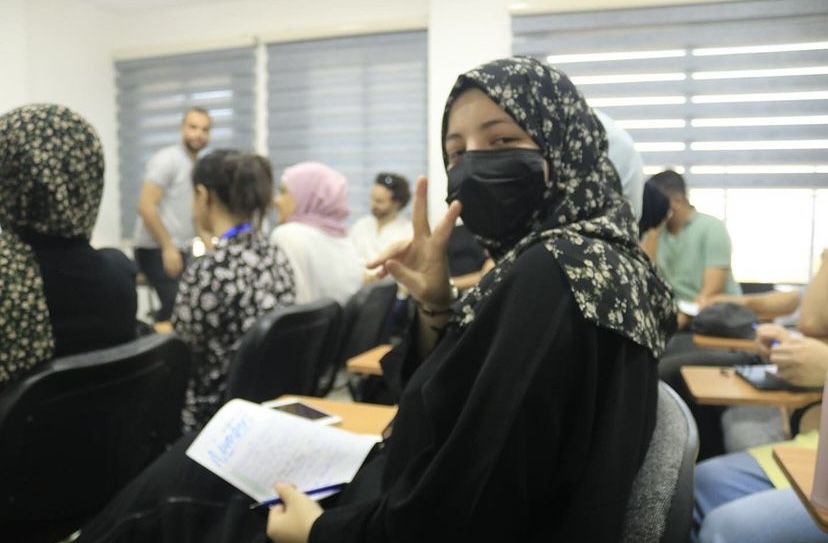
Thankfully, Gaza’s dedicated rescue workers took Omar, and recovered his friend’s body, then transported Omar to the Kamal Adwan hospital. “I glimpsed at the bone that was protruding from my leg. A nurse rushed to clean the wound and began operating on it without anesthesia, or even enough suture thread due to a shortage of supplies. The pain was excruciating, and the surgery was incomplete since a part of the wound remained open after the nurse ran out of thread.”
Despite the hardship faced in the last 11 months, Omar’s passion for writing persists, “I have always wanted to be a speaker for freedom,” Omar told me.
Omar reflected on our time together in Gaza, telling me “I remember when you came and visited us. It was really inspiring to see a Palestinian-American with us because it gave me another idea that Palestinians are everywhere and there are people outside that know about us and are standing by our side despite their own lives.”
“They (Palestinian-Americans) are not living under siege, they have their own lives, they have everything there (in the US), but at the same time they are still thinking of us and helping us and staying by our side.”
‘Not Another Nakba’ – Amer
Amer worked as a project assistant with WANN and was tasked with training young adults in Gaza in media, journalism, and English writing. Not only did he train them, but he connected them with news agencies, giving many unemployed, poverty-stricken youth connections to what would become their primary sources of income. “I just wanted to do something for my colleagues and friends in Gaza. I did it proudly.”, he told me.
These young journalists now dominate journalism surrounding the Gaza genocide on the world stage. But Amer didn’t want to stop there. In September of 2023, Amer moved to Dublin to pursue his master’s degree
“September was the most beautiful month in all of my life,” Amer recalled. “Then the war erupted and turned my life into hell…literally hell.” In the coming months, Amer would lose his uncle, 7 of his cousins, and his family home; His family is now displaced for the tenth month. “We have lost everything.”
Amer is now stuck in Ireland, unable to return home to his family amid the chaos of the Israeli genocide. “We are away from the war, but our minds are completely occupied there. I wish I had been there. I wish I hadn’t traveled and stayed in Gaza. Because that would be easier for me rather than being here far away in a safe place” while his family is in imminent danger.
“I expected my master’s would be a benchmark in my life, to be the most beautiful years in my life, but really it’s the worst year of my life. I didn’t enjoy this experience. I spend all of my day on my phone, reading the news, and checking on my family and friends. I feel guilty when I do my daily routine like eating, and hanging out with my friends, because my family is deprived of that.”
When asking Amer about his hopes for the future, he reflected that first and foremost, he wishes for an end to the war so that Gaza could be rebuilt and those displaced outside of Palestine could be reunited with their families, “cause I don’t know if I will have the opportunity to meet them (again) or not.”
Amer told me his family is hesitant to leave Gaza. “They don’t want the Nakba to occur again, but at the same time, this is their lives. This is the only opportunity to survive, but even survival is so luxurious in Gaza.”
‘All Working for Liberation’ – Rami
Rami began his audio messages to me via WhatsApp with an unwarranted apology: “I’m really sorry for the late reply but you know you can imagine the situation here. I am responsible (for the family still in Gaza) so I do a lot of things, bringing water, bringing food, making the fire and other things. Besides the evacuation from place to place.”
Rami’s life, like those of my other friends and family in Gaza, is unrecognizable from when I saw them last.
When I met Rami in 2022, he was a 25-year-old student and aspiring journalist with WANN, studying English language and literature at Al-Azhar University. After graduation, he also aspired to continue his education, potentially applying for his master’s abroad.
Rami now finds himself displaced with his family, forced to concern himself with survival rather than his bright future. Regardless of the daily struggles, Rami blossomed as a journalist throughout the duration of the war, writing for various outlets around the world. “I love writing – it’s like my cup of tea,” Rami told me.
“It’s not just writing about people or telling stories; it makes me take the heavy things on my heart and put them on paper – it’s a kind of freedom for me.” While it has served as a powerful outlet for Rami, he also understands it as a responsibility to communicate the realities of those living under Israeli siege and genocidal occupation.
He also continues this legacy for the sake of his friends and WANN colleagues lost to the Israeli genocide, like fellow WANNers Yousef Dawas, Huda Suffi, and mentor Dr. Refaat Alareer.
“Yousef was one of my best friends and I love him. And Huda Suffi, she was in the 2023 cohort…I still remember her smile when she published her first story because I was with her and Dr. Refaat Alareer. I couldn’t skip all these moments and all these memories we had together in WANN.”
Everyone mutually had only beautiful memories to share of Dr. Refaat. “He is not only a professor or a teacher, he was a brother and a mentor for most journalists here in Gaza. He was a friend to all of us, when someone was in trouble, he would send help. He always tried to help others.” Rami reflected
“It was one of the worst losses for all of us, for all of Palestine. But his legacy will remain, and we all work to keep his work. All of us are part of his work, we are all working on the same line, for freedom, for liberation, so when we lose someone, the others keep carrying the flag and carrying the work. So, people like Dr. Refaat – they don’t die.”
As the Gaza genocide surpasses its 11th month, the devastating implications are that the lives of all Gazans remain in a tragic state of limbo. Not only has their education and careers been put on hold, but all life plans, including the most basic one – when will they ever get to return home?

– Zarefah Baroud is a PhD candidate at the University of Exeter’s European Centre for Palestine Studies. Baroud received her master’s degree in policy studies from the University of Washington, where she researched American aid programs to the Israeli military. You can find her articles in Al Jazeera, Mondoweiss, Middle East Monitor, Palestine Chronicle, and others. She contributed this article to the Palestine Chronicle.

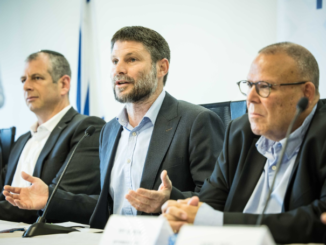

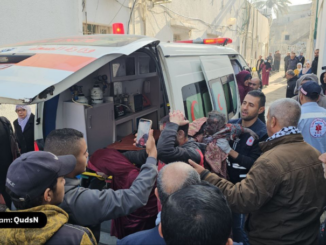




For what it’s worth, many Christians are praying for Gaza: https://folkpotpourri.com/weaving-the-tapestry-of-faith/ This horror won’t last forever.